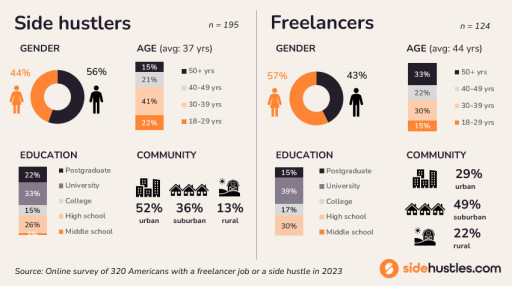
Independent Workers: Side Hustlers vs. Freelancers
Side hustlers engage in self-employed work alongside their primary job. Freelancers use self-employed work as their main or sole income source.
LOS ANGELES, December 4, 2023 (Newswire.com) - The gig economy, characterized by side hustles and freelance work, is witnessing unprecedented growth. Yet, gig workers have remained an elusive population.
To shed light on the characteristics of independent workers going into 2024, SideHustles.com conducted an in-depth survey, engaging 320 independent workers across the United States who rely on various forms of self-employment, be it as a side hustle or their primary source of income.
The side hustle survey results provide valuable insight on the current and future impact of side hustle culture on the job market.
Key Insights from the Survey
1. Future Outlook of Independent Employment
"As tensions between employers and remote workers grow in the aftermath of COVID, work delinquency rates like these foreshadow work-from-home crackdowns and 'return to office' pushes," says Mark Slack, cofounder of SideHustles.com.
The survey results suggest several trends that could shape the future of freelancers and side hustlers in different industries.
- "Daylighting," the practice of side hustling during primary job hours, is prevalent among remote workers, with 85% of home-based side hustlers engaging in this behavior.
- Less than half (42%) of side hustlers plan to eventually replace their main job with their side hustle.
- Side hustlers are ready to embrace AI, with more than half planning on using it for their work and just 12% fearing it will take their jobs
- AI is especially being used for idea generation and content creation.
2. Side Hustles, the Economy, and Inflation
The rising prevalence of independent work is largely due to increased living costs and inflation. COVID-19 caused a major boom in side hustles, with 26% of current side hustlers having started their side hustles in 2020.
Effects of economic factors on independent work:
- The main negative impacts of inflation are fewer customers (30%) and increased job competition (28%).
- 19% of independent workers have benefited from inflation by raising their prices, particularly in manual labor and IT services.
3. Challenges Faced by Independent Workers
The challenges that independent workers face vary depending on their age, job type, and whether they freelance or side hustle.
Core challenges by group:
- 26% of gig app workers struggle with high competition from other users.
- 52% of freelancers struggle the most with unpredictable earnings.
- Side hustlers often struggle with time management; those in their 30s are 2-3 times more concerned they don't have enough time for work.
*SideHustles.com conducted the survey using Pollfish over the last quarter of 2023. For more information or the full survey data, contact [email protected] or (843) 480-0810.
Contact Information:Mark Slack
Co-founder
[email protected]
(843) 480-0810
Original Source: Survey Finds 85% of Remote Workers Are Side Hustling on Company Time: SideHustles.com Reports